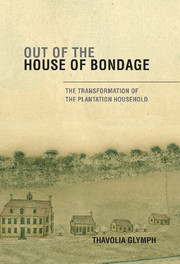Book contents
- Frontmatter
- Contents
- Acknowledgments
- Abbreviations
- Introduction
- 1 The Gender of Violence
- 2 “Beyond the Limits of Decency”
- 3 Making “Better Girls”
- 4 “Nothing but Deception in Them”
- 5 Out of the House of Bondage
- 6 “A Makeshift Kind of Life”
- 7 “Wild Notions of Right and Wrong”
- Epilogue
- Bibliography
- Index
- References
1 - The Gender of Violence
Published online by Cambridge University Press: 05 June 2012
- Frontmatter
- Contents
- Acknowledgments
- Abbreviations
- Introduction
- 1 The Gender of Violence
- 2 “Beyond the Limits of Decency”
- 3 Making “Better Girls”
- 4 “Nothing but Deception in Them”
- 5 Out of the House of Bondage
- 6 “A Makeshift Kind of Life”
- 7 “Wild Notions of Right and Wrong”
- Epilogue
- Bibliography
- Index
- References
Summary
We were taught to speak very low and to be delicate in our ways.
Kathleen Boone Samuels, ex-mistressOh, Lawd, let me see the end of itafore I die, and I'll quit my cussin' and fightin' and rarin'.
Chloe Ann [Hodges], ex-slaveShe didn't never do anything to make us love her.
Annie Hawkins, ex-slaveI grieve that you will never know the tender tie that existed between mistress and servant.
Mary Norcott Bryan, ex-mistress“Course I'se born in slavery, ageable as I am. I am a old time slavery woman and the way I been through the hackles I got plenty to say about slavery.” This is how, in the 1930s, Lulu Wilson began her interview, establishing first her authority to speak about a system that, she said, had “no good in it” and, among other subjects, about the man and woman who had owned her:
Now, Missus Hodges studied ‘bout meanness more'n Wash [Hodges] done. She was mean to anybody she could lay her hands to, but special mean to me. She beat me and used to tie my hands and make me lie flat on the floor and she put snuff in my eyes. I ain't lyin’ 'fore Gawd when I say I knows that's why I went blind.
Her former master, Wash Hodges, was “jes' mean, pore trash and he was a bad actor and a bad manager.” He beat and starved the few slaves he owned and kept up a steady pattern of selling her mother's children.
- Type
- Chapter
- Information
- Out of the House of BondageThe Transformation of the Plantation Household, pp. 18 - 31Publisher: Cambridge University PressPrint publication year: 2003

